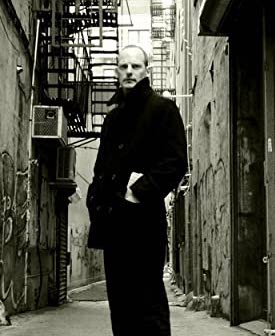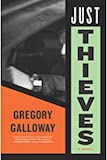knew early on that I wanted to steal. The only question was how much and from where. Do I take a little or do I take a lot; do I take from the big, obvious targets, or steal from the obscure, less noticed places. You have to plan your heists carefully, I thought, but in the end maybe it didn’t matter. Just take what you need. I didn’t care if I got caught, in fact, I wanted to get caught. I confess, I’m a thief. Of course I am; I’m a writer.

From the beginning of writing Just Thieves – about a pair of professional thieves who steal for hire – I knew I had to deal with the crime fiction I admired, the writers and films I had absorbed for most of my life. Dashiell Hammett, George V. Higgins, Dorothy B. Hughes (just to mention the H’s), etc., etc. The trick was how much of that influence to embrace.
When I began writing Just Thieves, I didn’t have much idea of a plot; I had started with a scene of the two main characters talking in a car as they are about to steal something from a house. I didn’t know what they were stealing, but I thought it wouldn’t be much, something insignificant relative to their preparation and commitment. I had that, and thought the stolen object would be the Hitchcock-like MacGuffin at the center, something that would drive the action but becomes less important as the story goes on. As I wrote more and more of the novel, however, I saw that my MacGuffin was gaining importance, not losing it, and becoming more like the Maltese Falcon, an integral part of the story. The question was, whether to turn away from the influence of Hammett, or embrace it.
In lit crit terms, it’s called the anxiety of influence. How much is a writer impacted by what the writer has read, and how much is original? I opted to run toward my influences, and try to use the original sources that shaped what and how I write in order to make something original and all its own. This is, of course, nothing new. Musicians do it all the time, as do filmmakers, borrowing riffs, hooks, camera shots, even melodies and plots reworked into unique works. Brian DePalma made a career out of reworking Alfred Hitchcock; Quentin Tarantino prefers to take a little bit from everyone, and current Hollywood is rife with reboots and remakes. And writers obviously, from the famous (John Ashbery, T.S. Eliot and some guy named William Shakespeare) to the less known (like me) allude, reference, paraphrase, quote, borrow, or steal from each other all the time. The Simpsons would not exist without its constant spoofing of other songs, shows, movies, books, whatever pop-culture currency it’s writers can get their greedy hands on; it is almost entirely referential, and yet somehow not entirely derivative. That’s the trick – to make something new out, and apart, from everything else. In the end, that was the needle I wanted to thread. Just Thieves works on its own (I hope) – you don’t need to know The Man Who Was Thursday or The Thief’s Journal (although I hope you do), but it’s there if you notice, just like you don’t need to know that Paul McCartney “pinched the bass riff from ‘Talkin’ About You’ by Chuck Berry in ‘I Saw Her Standing There,’” (or that “Come Together” is a direct homage to Berry’s “You Can’t Catch Me”) but it’s a little more fun when you do. Everything casts a shadow.
So I spent a lot of time in the shadows, a lot of shadows. In a book about (among other things) debt and the inability to escape the past, I thought it appropriate to tip my cap and pick a pocket here and there. I preferred to take from a number of different sources – reworking a scene here, lifting a line there – rationalizing that a book about thieves should have some theft of its own. I liken this to more of the sampling that was used on albums like Public Enemy, Paul’s Boutique, and 3 Feet High and Rising, nods in the mix, not the main line of the piece. I tried to acknowledge most of my sources in Just Thieves, with a comprehensive list at the end of the book, but left at least three “easter eggs” tucked away in the pages for the reader to find. A thief has to keep some of the cache hidden.
What they are saying abut JUST THIEVES
Just Thieves happens in a wonderful space where digression and story-telling ride out together. There's room here for much of the world and for reminders that life itself is a digression. I enjoyed and admired this novel. - James Sallis
Just Thieves is at once a brisk caper novel and a deep dive into the motivations that propel all of us, thieves and otherwise - - family, loyalty, and most of all love. Great fun and profoundly sad at once, which is no mean trick. --Scott Phillips, author of The Ice Harvest
"When a book begins with a dead horse, you know it's going to be good, and Just Thieves, a taut, understated, brilliant noir, is not only good but great."--CrimeReads
A sucker punch noir that is also a powerful and haunting allegory of work, debt, and power. --Richard Price
- Publisher : Melville House Publishing (14 Oct. 2021) £16.99 HBK/ eBook £6.79
